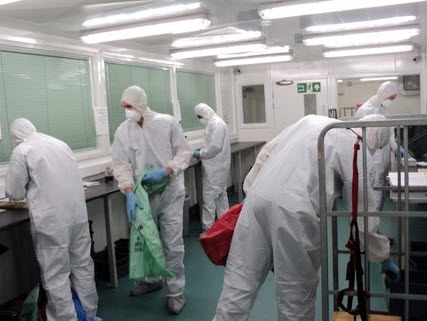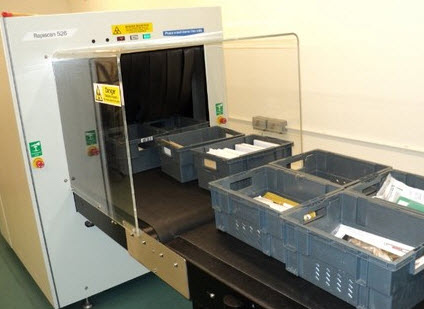Screen Out Threats
Terrorist threats are driving mailroom screening services to protect corporates and public services from actual and reputational damage. Michael Herson’s special report for PFM examines this developing but unseen market sector.
Mail Screening, whereby a company’s mail is scanned for metal objects and/or substances, is a market that is driven almost totally by terrorist events. The London bombings five years ago prompted a surge of interest in the service, while for other sectors (eg. Financial services in the aftermath of the recent banking crisis) feel vulnerable due to adverse press coverage. “It is driven by threat” explains Geoff Haw, consultant services director for Swiss Post Solutions.
The levels of service are governed by the PAS97 guidelines issued by the Government, which specify five levels of service from the basic X-ray, to the enhanced X-ray, up to the fully enclosed environment, by partly or fully opening mail and checking for substances. Not all customers opt for all levels of service and the majority of the marketwill still be classified as the basic X-ray equipment that can be seen in any airport when departing on a flight.
|
|
The service can be provided either on-site or off-site. Richard Thompson, managing director of Pitney Bowes Management Services confirms a trend towards handling the mail off-site particularly for larger contracts. “It transfers the risk from on-site to off-site,”he said.
One of the key drivers for this is the cost of downtime due to false alarms and the economies to be gained by shared facilities within a particular sector, (eg. banking). “We’ve got a dedicated facility like no-one else and, therefore, it’s attracted the very high end spender.” adds Thompson.
MITIE Business Services head of procurement, Stuart Matthews, endorses this view. “For an investment bank, it’s a huge risk as your core business activity will suffer whilst suspect packages are being investigated. So our recommendation would be to screen off-site”
One of the best placed suppliers to offer the offsite service is Royal Mail because they have access to the UK network of Mail Centres in which to locate the equipment. However, currently they only offer the X-ray service as Ken Taphouse, Product Manager for Mail Screening explains. “We intercept and open the mail on Royal Mail premises, screen it, then deliver the mail with no delay to a same day delivery”
Haw confirms the trend towards off-site “We’ve seen more and more off-site requests. Swiss Post Solutions offer dedicated screening centres for our clients. In some cases off-site centres can in fact be more cost-effective than on-site screening.”
MITIE, one of the leading FM companies offering this service, has two dedicated off-site facilities for specific clients. However, Matthews confirms that it is demand driven “It’s not a market we target or push. Clients tend to come to us after having identified a potential risk, leveraging not only our knowledge but also to utilise our supplier network to see how we can jointly overcome/mitigate that risk”.
This view is endorsed by Taphouse “It’s very much a case of only certain companies wish to have their mail screened, who feel they’re under a certain amount of threat.”
Thompson reports that threat levels can go up and down and therefore the level of screening will move in tandem “For example in Government, they have a requirement to go to 5 or levels 3 or 4 based upon whatever level they deem the risk is at any one time. We are able to scale our solution accordingly”.
For those companies that prefer to conduct mail screening on-site there is a full spectrum of available equipment from machinery suppliers such as Analysed Images and Neopost (distributors for Scanna equipment). It ranges from desktop cabinet X-ray systems to compact free-standing cabinet X-ray systems.
Antony Paul, marketing manager at Neopost explains: “It looks like a large filing cabinet, the top part of which is a radiation chamber; so you place the parcels within that and X-ray scanning takes place at the touch of a button. The contents are viewable on a separate monitor and further image analysis and interrogation can be carried out by the operator”
Neopost report that the budget is an affordable £2.500 for an entry level desktop up to £15,000- £16,000 for the cabinet scanners. The equipment is normally leased over a 3 – 6 year period. New developments centre around two areas.
Swiss Post Solutions is close to offering 3D viewing for X-ray equipment, with the first machines installed in their Wootton Bassett facility. Their new QUAS8 will identify threat levels faster because “It gives colours based on the level of threat. You can actually see a lot better in 3D. You’ve got mobility and flexible images,” explains Haw.
Another area of innovation is biological screening. Pitney Bowes is one of the leaders, having transferred knowledge gained with working with the US Postal Service specifically on anthrax protection and detection. Pitney Bowes has also noticed an increase in client interest in the detection of Ricin.
Alan Peters, UK Sales Manager at Analysed Images is also aware of this trend. “In terms of future developments we’re looking at developing tools to improve the identification of substances that present particular chemical, biological and explosive threats to mailrooms,” he said, Analysed Images also provides an on-line questionnaire to assist organisations to evaluate and perform mailroom risk assessments. (See http://www.analysedimages.com/ThreatAnalysisQuestionnaire.aspx)
|
|
One of the issues in trying to study this market, particularly in respect of how it is priced to end customers, is that the screening service often forms part of a larger service, rather than offered as a stand-alone product. Haw at Swiss Post Solutions reports “About 70 percent of mail room management customers have screening attached to their contract in one way or another”.
Swiss Post Solutions will calculate the price based around the range of mailroom services deliverable under the client’s contract and the volume of mail and packages required to be screened. Pitney Bowes, however, reports that unitary pricing is sometimes specified within the SLA and is client driven based on the degree of transparency required for management information. However, this is usually more applicable to on-site than off-site screening where, at the high end, there will be an annual fixed contract. MITIE operates a variety of different pricing models to suit the needs of its clients.
Naturally, the sectors to which mail screening appeals are limited with the key ones being government, financial, pharmaceutical and secondary sectors such as media and VIPs. Suppliers are reluctant to admit who their customers are for obvious reasons.
Because it is event driven, most suppliers report that the market is either static or in very slight growth. This type of business rarely goes out to open tender due to the security issues, so it is important for suppliers to keep their ear to the ground on potential opportunities, and work alongside the FM companies who are managing the services of entire building and view Mail Screening as one small part of their total service offering. Of those interviewed, only MITIE were found to deliver their own service.
Carillion outsources its service to Swiss Post Solutions. David Dorling director of marketing and communications at Swiss Post Solutions explains that partnerships are a key part of their strategy “We work with a number of FM companies, including Carillion and Johnson Controls Global WorkPlace Management whom we have worked with over a number of years.”
According to Lyndon Plant, Director of Analysed Images: “The mailroom is a key point of entry for goods and personnel at many organisations and is often under-represented in risk assessments. This indicates significant opportunity for FM companies to provide a valueadded service to customers through the application of mailroom business continuity risk assessments and the implementation of appropriate threat-mitigation measures.”
Other examples of partnerships include Pitney Bowes, who partner with document processing outsourcer, Williams Lea.
More Information
MITIE Business Services
Swiss Post Solutions www.swisspost.co.uk/solutions
Pitney Bowes Management Solutions
Analysed Images
Royal Mail
Neopost
Although the market is clearly event driven, there is nevertheless the potential for FM companies to derive more revenue from Mail Screening as an add-on service to their core operations; most probably by partnering with one of the companies that already supplies the service.
There appears to be a willingness to offer white label, and therefore there is no loss of identity for the FM’s. For the end customers there are multiple options at all levels of service — in effect it becomes a form of insurance to protect employees.
This article has been prepared for PFM by Michael Herson of London based The Strategy Works – a strategic marketing consultancy specialising in original business to business insight.

